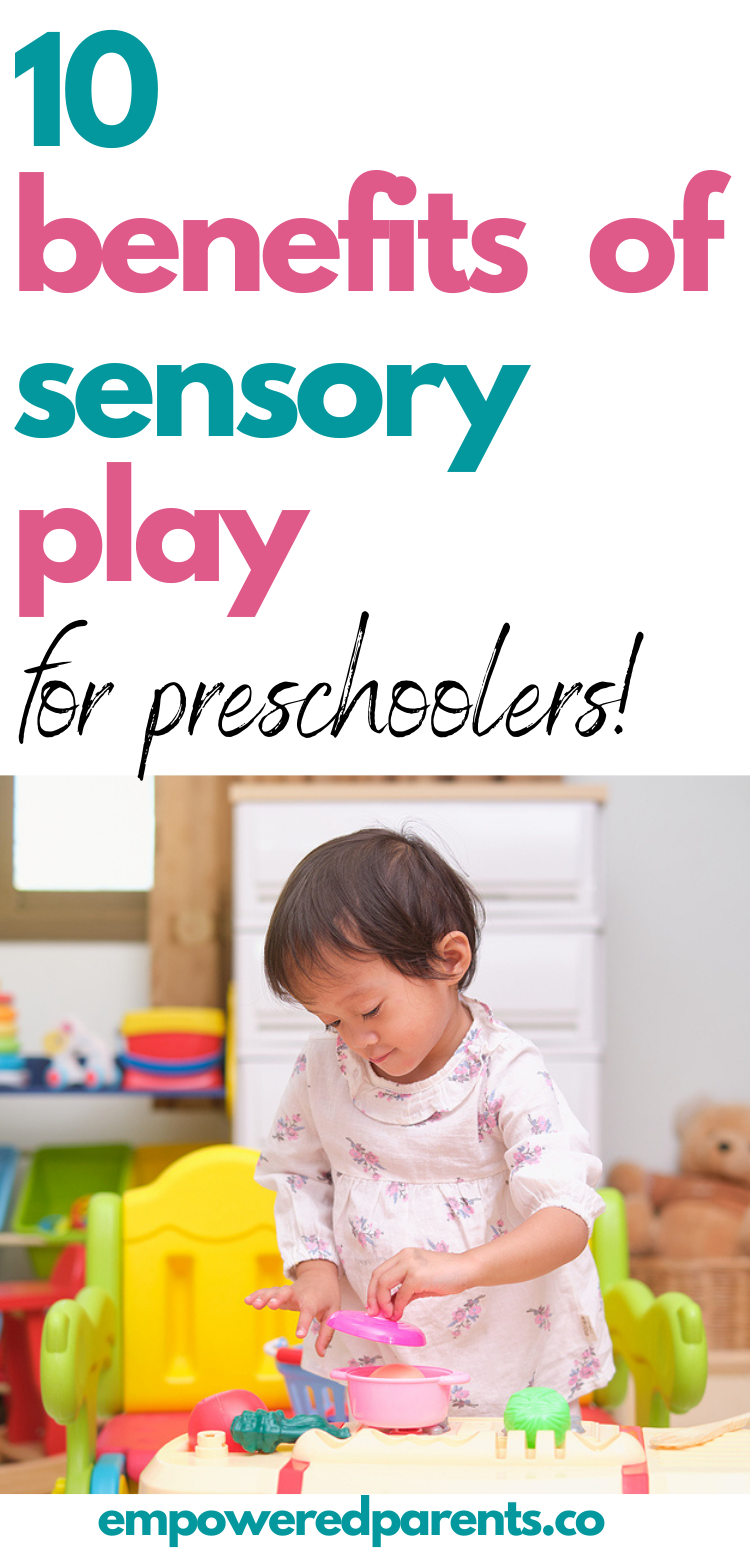Sensory play for children is about hands-on activities that stimulate all or most of their senses.
Those senses include the five with which you are possibly most familiar: smell, touch, sight, hearing and taste; as well as body awareness (proprioception) and balance (vestibular).
Keep reading to find out 10 incredible benefits of sensory play for babies, toddlers and preschoolers.
What the Theorists Said About Sensory Play
Although sensory play theorists have held differing views over the years, they’ve agreed on many aspects of the importance of sensory play to spark the senses and help children learn.
Friedrich Froebel
Friedrich Froebel (1782-1852) was the German educator who invented the concept of kindergarten.
His theory of human development included the idea that children learn and develop their understanding of the world by directly experiencing it through hands-on play.
Jean Piaget
Swiss psychologist, Jean Piaget (1896-1980), said in his theory of cognitive development that young children in what he called the sensorimotor stage (birth-2 years) learn a great deal about cause and effect as they explore with their senses and gain control over their motor abilities through play.
Lev Vygotsky
In Russian psychologist Lev Vygotsky’s (1896-1934) sociocultural theory on play, he suggested that through the stimulation of make-believe play in the sensorimotor stage, kids are able to transition to even higher forms of symbolic thought.
Maria Montessori
And the Italian physician, Maria Montessori (1870-1952), said, “Play is the work of the child.”
She developed a popular method of education that offered sets of materials, such as sand trays for drawing and writing, that were built upon an appeal to the senses of children.
Today more than ever, researchers and educators understand the importance of sensory play in early childhood and how it is essential to development.
During the early years when kids have yet to master language, using their bodies effectively in order to learn is imperative.
The 10 Benefits of Sensory Play
Here are 10 areas of development that sensory play benefits:
1. Brain Development
Sensory play has been proven by research to strengthen the nerve connections in the pathways of the brain.
This occurrence leads to stronger memory skills and also builds a foundation for even more complicated learning tasks in the future, including those related to language skills and problem-solving.
2. Cognition
The acts of observing, trying new experiences and manipulating new materials all work together to expand the thought processes of children.
They can learn pre-math skills, such as size comparison, sorting, patterns and matching.
Children also learn about science when they take part in experiences such as determining what sinks or floats in water and how gravity works with their bodies or various materials on the playground.
They also begin to see connections between the various materials they work with, such as those having similar properties, like sticky, smelly, cold or smooth.

3. Awareness
Taking part in sensory activities helps kids become more aware of the spaces that physically surround them (and their position in space) and also more mindful of themselves as individuals, separate from their parents, siblings and playmates.
They could also become more aware of their strengths and abilities, which can lead to enhanced self-esteem.
4. Adaptability
During sensory play, kids regularly find themselves in interesting, new situations to which they must adapt successfully.
These affirmative experiences help them gain confidence and make them even better able to adapt when the next new situation appears.
Because of this positive feedback they have received, children could be more apt to seek out fresh challenges, going forward.
5. Comfort
The emotional benefits of sensory play are sometimes overlooked.
For many children, tactile play can be very soothing, such as using their hands to knead cool playdough or running sand, rice and water through their fingers in sensory bins.

Kids who are tense, worried or upset can often become more involved in a pleasurable sensory activity and then set those negative emotions aside, at least for the time being.
6. Language Development
While they take part in sensory play together, children have countless opportunities to practise communicating verbally.
They attempt to talk about their world and what they are experiencing or to convey their ideas, wishes and opinions.
And the strong oral language skills they form in this way can then lay a solid foundation for learning to read.
In addition, when kids use the muscles in their fingers and hands during sensory play, they build pre-writing skills that are necessary for written language.
7. Motor Skills
Children touch and move things as a form of texture and shape exploration. While pinching, turning and pouring, they exercise and fine-tune the small muscles, mainly in their fingers and hands.

As kids crawl, jump, kick, climb and run while interacting with things like stairs, balls and playground equipment, they develop the large muscles in their arms, feet, legs and torsos.
8. Creativity
An open-ended project where the process is more important than the end product is important when offering exciting sensory materials to children.
While “painting” with shaving cream on a tabletop, for instance, kids can picture touching the clouds up in the sky.

When children have fun using their imaginations and feel good about the outcomes, their self-esteem grows, making it even easier to explore their creativity the next time.
Try these process art ideas to get the senses involved in creative art.
9. Problem Solving
When children interact with a wide assortment of materials and open-ended activities, they have many opportunities to make predictions, solve problems, make decisions and compare the results against their original predictions.
They can then try alternative strategies the next time to see if their results are different.
10. Social and Emotional Development
Kids often work in small groups or side-by-side during sensory play, which helps them learn to communicate, share and get along together.
These types of situations also help them gain empathy and guide them in learning to see situations from another child’s point of view, which leads to enhanced mindfulness.
Sensory play in early childhood is especially valuable because it encourages inclusion and acceptance.
Assuming adults give children safety and kindness guidelines, all outcomes are okay, with no “right or wrong” answers and results.
This openness benefits all children, including those who speak a second language or those with special needs.
These are just a few sensory play benefits.
Here are some ideas for sensory stations you can set up in your home or classroom, as well as more info on how children learn through play.


Mary Takyi
Friday 12th of April 2024
Educational and insightful I'm definitely trying them with my kids
Tanja McIlroy
Friday 12th of April 2024
Thanks for reading!